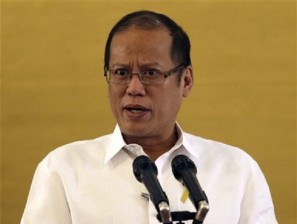President Benigno Aquino has ordered the Department of Public Works and Highways (DPWH) to suspend the construction of three bridges costing P20 billion amid charges of multibillion-peso kickbacks from the projects during the Arroyo administration.
Presidential spokesperson Edwin Lacierda confirmed that the President had agreed to the recommendation of the DPWH to suspend the projects, which were approved by the National Economic and Development Authority (Neda) and had financing from Britain, Austria and Spain.
The DPWH had to freeze the projects as a Senate inquiry into the bridge program had turned up irregular transactions involving pricing and implementation during the administration of President Gloria Macapagal-Arroyo.
The projects were largely brokered by Ang Kasangga Rep. Teodoro Haresco.
Lacierda, however, could not identify the specific bridge projects to be affected by the President’s order.
He said the President had criticized the projects in previous public speeches. “Certainly we’re not going to [proceed with projects] that the President [had found irregular],” he said.
Sen. Sergio Osmeña III said the bridges were constructed under the President’s Bridges Program, which began during the administration of President Fidel V. Ramos.
Billions lost
But it was during the Arroyo administration that most of the P111 billion allotted for the program was spent, Osmeña said.
Osmeña said the program involved steel bridges and he estimated that P10 billion to P15 billion could have ended up in private pockets due to “irregularities” in the program.
“This amount could have been divided among several people. Many received money, including those who attended these hearings,” Osmeña said in English and Filipino.
Osmeña, however, would not reveal who among those present at Monday’s hearing called by the public works committee were his suspects.
Best explanation
He said he believed it was Arroyo who could best explain the auction of the contracts for the construction of 14 steel bridges during her administration.
Some of the bridges remained unfinished, Osmeña said.
He said that as Neda presiding officer, Arroyo was present in all the Neda board meetings that approved the projects.
“She was never absent. She’s an economist and she was always the presiding officer of Neda meetings,” Osmeña said.
But Arroyo, he said, might use her current medical condition as an excuse not to attend the Senate inquiry. “But inviting her might be a good idea,” he said.
Suffering from a spine ailment and facing plunder charges, Arroyo is under hospital arrest at Veterans Memorial Medical Center in Quezon City.
Osmeña said he had invited two former public works secretaries—Zambales Gov. Hermogenes Ebdane and Deputy Speaker Simeon Datumanong; former Agrarian Reform Secretary Nasser Pangandaman and former Finance Secretary Juanita Amatong to shed light on the bridges program implemented by the Arroyo administration.
Why under OP?
All four did not attend the two hearings held so far.
Osmeña said he wanted Arroyo to explain why she placed the bridges program, which is partly funded by foreign grants, directly under the Office of the President (OP) during the early part of her presidency.
He said he found this irregular because other public works projects were also partly funded by foreign grants but were not placed under the OP.
Osmeña said the bridges program was later placed under the DPWH “but (Arroyo) put a protégé there so she could still control the funds.”
Osmeña also questioned why some the projects were selectively placed under Malacañang’s supervision through the program while others were examined by the DPWH’s planning services before approval.
